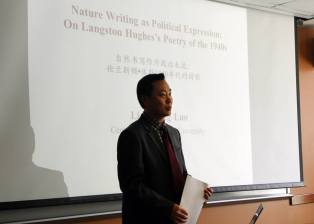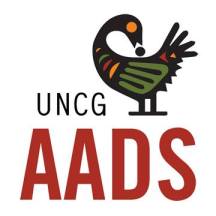Professor Lianggong Luo, School of Foreign Languages, Central China Normal University, visited UNCG on April 11th, 2016 and shared his most recent research, Nature Writing as Political Expression: Langston Hughes’ Poetry on Nature in the 1940s. Professor Luo’s presentation was held in the Maple Room, Elliott University Center, and was well attended by students and faculty. Luo stumbled upon the work of Langston Hughes and started translating Hughes’ poems and essays into Chinese in the late 1980s. Within that process, Luo came to know Hughes’ work more intimately and Hughes has become a central part in his scholarly research.
Luo’s current research focuses on Hughes’ use of nature and space, particularly his writings from the 1940s. Luo notes a shift from the radical/political expression of the 1930s to a new style in Hughes’ writing, one that is more experimental, related to nature and everyday life. Despite criticism from some of Hughes’ contemporaries who charged that Hughes’ reflections on nature were nothing more than “empty lyricism” and an “escape from reality,” Luo re-reads Hughes’ work to find the answer. Luo expresses that during this period Hughes was keenly aware of reality. Therefore nature was used as a metaphor for the harsh realities of racism, capitalism, and spatial ownership. Luo categorizes Hughes’ nature writings as rhetorical political expression and a critique against racism and capitalism. Hughes’ harsh depiction of nature is not anti-nature, rather as Luo suggests, nature is the reality within which African Americans continually struggle to survive in. Hughes also depicts nature in an idealized and imagined sense, his poems Birth, Heaven, and Love, express harmony and equality between humans and nature, but it’s clear that this relationship is imagined; a romantic and idealized expression of what could be an ideal world. But this is not reality. Luo illustrates how Hughes was influenced by the African American experience, culture, history, and their plight from the rural South to the urban industrial North. Through that journey Hughes demonstrates that African Americans are imprisoned in nature and reality, and nature served as a device for his political expression.
Luo’s interpretation of Hughes’ writings on nature is equally as impressive as his own scholarship and academic achievement. Luo has been published over fifty times and has written extensively on Hughes and other African American writers. We were certainly very lucky to have Professor Luo share his research with us and what an honor it was to have him at UNCG.



